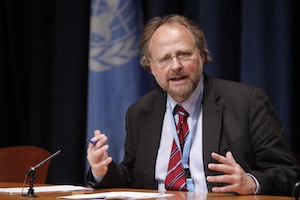
Following a two-year process and a series of workshops around the world on how better to implement Article 20 of the International Covenant on Civil and Political Rights on the ‘prohibition of incitement to national, racial and religious hatred’, the resulting Rabat Plan of Action was launched at the Human Rights Council in Geneva on 21st February.
Not only was the topic at the launch session of interest, but the development and successful progression over the past two years of the Action Plan was a UN first, because of the unique and unprecedented cooperation of UN Special Rapporteurs and Treaty Bodies (two mechanisms within the UN system that usually act independently of one another).
The right to freedom of expression (article 19) and the right to protection from religious, racial, and gender discrimination, hatred and violence, (article 20) are of increasingly intricate and conflicting concern across the globe.
In recent times, we have seen the problem exacerbated with increased access to social media and Internet forums. The violence and hostilities unfolding across the world after the September 2012 release of the anti-Islamic ‘Youtube’ video and the 2005 publication of Muhammad cartoons in a Denmark newspaper were given as examples of violence being incited by individual expressions of unrestricted freedom of speech. The challenge for governments within the Rabat Plan is thus the creation of processes to address these situations.
The launch saw overwhelming support for the Action Plan from all States present.
In her opening statement, Navi Pillay the High Commissioner for Human Rights, remarked at the extraordinary significance of the gathering of expert’s on this issue who have “devised a clear pathway to help us identify where to draw the demarcation line between freedom of expression and incitement.”
Perspectives on the issue however differed greatly, and as Pillay further noted, “some are calling for much tougher restrictions on permissible expression … while others have maintained that freedom of expression should be near-absolute, pointing out that laws limiting speech are very often misused by authorities to muzzle critics and silence dissent.”
Despite this variance in opinion, the expert recommendations did consensually focus on the integral need for prevention methodologies and the insurance of national and international preparedness to these situations of inciting behavior, as the best move forward.
Significantly the action plan emphasized education, dialogue and ‘positive speech’ rather than criminalization and legislation to counter hate speech. In particular the use of ‘blasphemy laws’ were rejected and the repeal of such laws was urged.
Particular focus was given to:
- The importance of education and informing people from a young age about differences of race, religion and opinion
- The essential use of positive and alternative speech as a combative tool to decelerate undesirable hype
- The important responsibility of the media, civil and religious leaders, and educators to promote this notion of ‘positive speech’
- The state provision of access to public media to all groups in society, specifically to marginalized and minority groups
- In determining the threshold of what constitutes incitement, the intent, content, the feasibility and immediacy of harm resulting, and the context of the unacceptable speech must be considered.
The challenge now is to ensure the implementation of the action plan.
(Jordan Wren ERI intern)
Photo shows Heiner Bielefeldt, UN Special Rapporteur on Freedom of Religion or Belief, one of the key contributors in the drafting of the Action Plan.(UN photo UN Photo/Paulo Filgueiras)